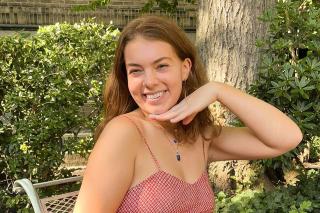CJ ’24 (Chloie Johnson) attended the American Physical Society’s Conference for Undergraduate Women in Physics (CUWiP) at Boston University in January 2023. They spoke with us about their experience at the conference and their love for science.
Tell us about the purpose of this conference.
The CUWiP is about connecting with women in the field, including your peers and other undergraduates. While undergrads typically give papers and presentations, graduate students, professionals, and professors also attend. At this event, professors and people in the industry function as mentors, available and willing to engage undergrads in conversation and give us advice about graduate programs and research projects. We learn from them and they support us.
I attended several talks about women’s contributions to current research in physics. Some presentations also provided information on how to support yourself emotionally and others as a woman in physics. It is important to support women in STEM, because many of these fields are still male-dominated.
What motivated you to attend the conference?
One of my professors told me about the opportunity to apply to the conference. I wanted to connect to my peers and get a better sense of what you can do with a physics background. Personally, I find it very inspiring to speak to experts in the discipline, and I spent a lot of time talking with graduate students, professionals, and professors. For example, I had the opportunity to speak with Professor Kenneth Lane at Boston University, who works in high energy labs and researches particle physics. Physics is a big field, and it was wonderful to hear what people are doing within it.
Are you currently conducting research at Simmons?
I work in Professor Jason White’s biomedical engineering lab. Our project, which is in its early stages, is related to the brain and CTE (Chronic Traumatic Encephalopathy). CTE is a condition that we find in people with repeated traumatic head injuries. The research that I am doing in the lab is based on work looking at military personnel who have experienced bomb detonations while in combat. Those intense pressure waves can affect their brains, creating an effect in the skull called cavitation. With cavitation, the fluid around the brain experiences a rapid forming and popping of bubbles.
We are currently testing micro-cavitation, a smaller version of this effect, which the brain can experience from direct contact with another object. We hope to connect this repeated bonking of the head, as occurs with football players, to CTE, which is experienced by many former players. Our theory, based on the research available and our preliminary data, is that repeated experiences of micro-cavitation can damage the brain and is a possible cause of CTE.
What is your major?
I am a Physics and Chemistry double major and a Mathematics minor. I have always been interested in physics, and I consider it the basis of the universe. I also went into chemistry because I believe it is important for people to better understand science. Women are consistently discouraged from pursuing degrees in STEM-related disciplines, so I wanted to push back against this. Moreover, there is a sharp divide between the scientific community and the general populace, which has been exacerbated during the COVID-19 pandemic. For this reason, I may go into science communication. This way, I can do research in the sciences but also render scientific advances legible to the public.
Why did you choose to attend Simmons?
I transferred to Simmons last academic year. My previous institution was much larger and it was co-ed. As a woman in STEM, I was one of five women in a major of about 400 students. I faced struggles being in a male-dominated area, and I realized that it was not the right learning environment for me. Simmons was attractive because it is a women-centered institution and has the resources to support me. I also wanted to attend a smaller school. I have made so many connections with my Simmons professors and they encourage me to think outside the box.
What are your plans after graduation?
I hope to go to graduate school and get my master’s and perhaps a Ph.D. in physics. I want to continue my research. I would love to delve into theoretical physics, and eventually science communications. It is my dream to be the next Bill Nye! I want to help people become passionate about science, and in doing so I may break down barriers and democratize knowledge.

